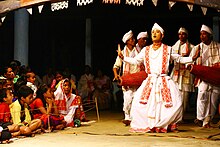Bhaona
This article may be in need of reorganization to comply with Wikipedia's layout guidelines. (September 2024) |

Bhaona (Assamese: ভাওনা) is a traditional form of entertainment, with religious messages, prevalent is Assam, India. It is a creation of Mahapurusha Srimanta Sankardeva, written in the early sixteenth century. He created the form to convey religious messages to villagers through entertainment. Later Srimanta Madhavdeva also wrote some plays.[1][2] The plays of bhaona are popularly known as Ankiya Nats and their staging is known as bhaona.[3] Bhaona is generally staged at xatras and namghars in Assam. There are some special characteristics of Bhaona like the plays, dialogues, costumes, ornaments, entry and foot-steps of the characters. These characteristics helps to differentiate Bhaona from other plays.

The bhaonas are written in the Assamese and Brajavali languages.[3]
In order to witness the Bhaona culture and traditions, one ought to visit Majuli, the largest river island in the world. Majuli receives a huge footfall of foreign tourists from all over the world every year. The natives of this island are very cordial and hospitable and overwhelm everybody with their simplicity. The different xatras perform and maintain the teachings of Srimanta Sankardev to this date keeping alive dying customs and preserving their heritage.

Different characters
[edit]
- Sutradhar or Sutradhari: He is an integral part of bhaona; he recites slokas, sings, dances and explains in prose what is what at every stage of Bhaona.[4]
- Bhaoriya : The actors performing characters as per script.
- Gayan : The singers.[3]
- Bayan : They plays khol, Taal etc. from the beginning to the end of bhaona.
Types of Bhaona
[edit]References
[edit]- ^ Bhaona, bordowathan.com, Retrieved: 2013-02-28.
- ^ "Today's Paper / NATIONAL : Assam's traditional Ankiya Bhaona to get new lease of life". The Hindu. 12 March 2012. Retrieved 28 February 2013.
- ^ a b c "Bhaona _ Traditional form of assamese entertainment". Assaminfo.com. Retrieved 28 February 2013.
- ^ "Assam- Arts- Classical Dance in Assam, Bhaona- Dances in Assam- Assamese dances". Webindia123.com. Retrieved 28 February 2013.
- ^ "Mukha Bhaona - Shivasagar Natya Vidyalaya". Retrieved 28 February 2013.
External links
[edit]- Video on YouTube
- About Bhaona at bordowathan.com.

